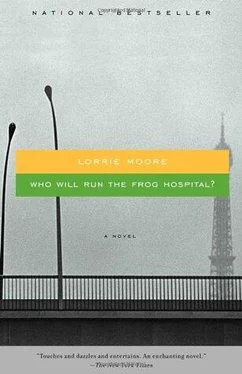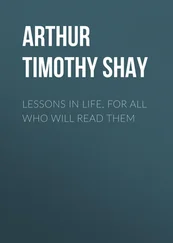“You took it?”
“I collected it. I kind of — hocked it. I just, I sold stubs and didn’t ring up.”
She looked at me and then at the money for a long time. A pumpkin into a coach: I hoped that was what she would see. For today, Tuesday, I would be her fairy godmother. I tried to swallow, but the pot had made my throat bitter and dry, my gums drained and astringed. I had to concentrate not to giggle. Or weep. Or sing. I had to concentrate to see.
At long last she looked up at me. “Don’t they count the stubs?” was all she said.
“Nope,” I said. “Not that I know of.” And then we did laugh. We laughed the laugh of idiots.
Sils fell into an ironic squawk. “This is going to go on your permanent record, missy,” she said, shaking her finger.
“We make a dollar sixty-five an hour. Do you think Frank Morenton, who owns half this country anyway, do you think he’d ever notice? He’s too busy opening Santa’s Little Village up in Dalesburg.”
“I suppose it serves him right for not giving us a raise.” And now she actually reached toward the money to touch it. “Let’s go to the James Gang concert,” she said suddenly. Now she was holding up bills. She plucked up a twenty and waved it around.
“Pardon me?”
“The James Gang’s giving an outdoor concert at the arts center at the lake,” said Sils. “God, with this money, we could take a cab.”
“Maybe I can get LaRoue to drive us,” I said uncertainly. I wanted to save the money. “Let me go see.”
LaRoue was in the kitchen polishing her riding boots. “We’re thinking of going to a concert,” I said, trying to be kind, lingering, swaying, hinting.
“And you want me to give you a ride.” She looked disgusted but also a little sad.
“You want to go with us?” I asked brightly, fakely.
She looked at her riding boots a long time, as if this were a challenge. The boots were set smack on the kitchen table, on a page of the Horsehearts Gazette . “What concert is it?”
“It’s the James Gang,” I said.
“What time?”
God, she was really going to do it. “At eight. But we want to get there by seven.”
“What about dinner?”
“It’s get-your-own night, Mom said.” Every so often my mother refused to cook, calling it, with a festive flair, “get-your-own” night, or “fix-your-own.” One year, in one of her darker huffs, she canceled Christmas and called it “Christmas Is Canceled Day.”
“Yeah, but I was going to make some brownies and macaroni,” said LaRoue. She was hugely overweight, though not even as much as she would be later in life. I blinked.
“Don’t do that,” I said. “Come with us. We can stop at Carroll’s.” Carroll’s was a fast-food shack that would soon be put out of business by McDonald’s. But at the time, we liked Carroll’s best, the bright red and turquoise colors, the squared and streamlined script of the name.
“OK!” she said. And as she said it, I realized again that I never did anything with LaRoue because she was odd and friendless and I was embarrassed by her, in a way that made me feel bad, but in a way that was sad and unshakable.
I sat in the front seat and Sils in the back, and I kept turning around and all the way up to the lake we kept singing “And When I Die,” in the harmony parts we had learned in Girls’ Choir the past year. Our choir director, Miss Field, had worked up a nice arrangement of it.
“I’m not scared of dyin’ and I don’t really care,’ ” began Sils.
“ ‘If it’s peace you find in dying, well then let the time be near.’ ”
“ ‘All I ask of livin’ is to have no chains on me!’ ” We practically shouted it. We were best on that line, taking it loud but slow, with some odd intervals, though most of them thirds. We actually didn’t know any songs by the James Gang, or we knew one, the famous one, the one that was a hit, but we didn’t know it very well.
At Carroll’s we ordered hamburgers and vanilla milk shakes and sat inside at the Formica counter, watching each other eat, or else watching some guy sweep behind the fryer or some guy pull up outside with his car eight-track blaring “In-A-Gadda-Da-Vida” or LaRoue, watching us, like we were up to something.
The parking lot at the Lake Arts Center was already full, and attendants were routing people into a spare one in the rear, usually reserved for employees. We parked there, got out, and headed for the entrance, an old blanket over our arm, a six-pack of Coca-Cola, and a pack of cigarettes. All around us were young men in beards and cutoffs, women in peasant dresses, buffalo sandals, and silver bracelets, carting thermoses, ice chests, lawn umbrellas that said “Peace.” Police were stationed just inside the entrance to inspect thermoses and ice chests for alcohol, but besides that there was something wonderful in the air: the loud, crowded, summery feeling of a rock concert, not Woodstock maybe, but we had only been twelve then. This was something festive for us now that we were fifteen; everyone older had been doing this for a while, and they did it with calm and know-how; nothing new or disorganized. Some of them carried babies. We observed them, fell in close to them in line, sat next to them on the lawn. Lawn seats were the cheapest: two-fifty apiece. We paid, got our tickets, headed in.
Music, for us back then, evoked various exiling and confounded moods, states of hallucination, states of love. A song was the timeless truth beneath the surface of things. It was a standing-still trip to the sea! It was a blow to the chest, like a boy you liked suddenly entering the room. It filled you with excitement and shy, deep knowledge. Two-fifty was nothing. We pushed ahead, fell in with the pace of the crowd. We prepared our hearts for something drenching and big.
Somehow we got separated from LaRoue. Did we intend to? I remembered a stinginess of hers in the car, how she’d refused us the chewing gum she had four sticks of in her pocket, and as Sils and I moved through the gate, past the ticket takers and off at a slight diagonal, the crowd moved in between LaRoue and us. She was trudging too slowly behind. I thought I heard her voice, but I didn’t turn around.
“Hey, you guys. Wait up!”
We kept walking straight for a favorite place on a hill near a concrete piling, the place we usually sat at concerts, leaning up against the cement to drink our Cokes, moving in under the balcony ramp in case it began to drizzle.
“Where’s LaRoue?” asked Sils.
I finally turned around. I couldn’t see her anywhere. And the success of this treachery, of my having used her so completely, stunned me. Where was she? Now I scanned the curving bowl of the concert lawn full of faces and heads and blankets and jackets and ice boxes, and I thought perhaps I did see LaRoue way off to one side, on some dirt, sitting alone without a blanket, looking lost and fat.
“I don’t know where she is,” I said. “We’ll get a ride back some other way.” I said this breezily. “We’ll hitch.”
“Maybe,” said Sils cautiously. “I wish I’d brought a joint.” She lit a Salem instead, and offered one to me, which I took.
Linda Ronstadt opened for the James Gang and everyone talked all the way through it, as if she were just some local girl who’d managed to crawl up there and fill time. When the James Gang finally appeared the crowd stood and cheered. The sky had darkened, and the stage shone bright as fire in a hearth. Everywhere in the air was the ropy smoke of pot. The boys next to us offered us some of theirs, and we took it, in turn, placing our own mouths where theirs had been on the wet paper, then passing it along, like a communion plate or a petition of ash and saliva: a large, smoking spitball shot out at all the teachers of the world. “Good evening, ladies and gentlemen!” The crowd roared, and the band started up.
Читать дальше












